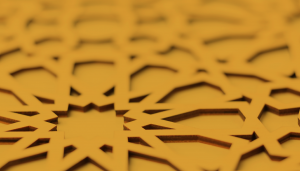Praise be to Allah, Lord of all the worlds, and blessings and peace of Allah upon His Prophet and Messenger Muhammad (ﷺ), his family, and all his Companions.
What is Baraka?

Baraka originates from Allah Almighty. This Baraka is capable of being transmitted to human beings, especially the Prophets (alaihis salaam), and through them to the holy persons and objects. The Egyptian scholar Imam Sha’rawi defined “Baraka” as Baraka is when you get something more than expected from something or someone.
Generally speaking, the Islamic Prophets (alaihis salaam), and the Ambiya-e-mursaleen Muhammed Mustafa (ﷺ), and through them, the Sahaba, the Tabiieen, Taba-Tabiieen, the Awliya-Allah, and holy persons are credited with Baraka. Great Sufi Shaykhs or Awliya possess a Baraka which is transmitted to others and which may remain associated with their tombs or shrines. A Muslim can also ask Allah Almighty through relics that belonged to pious people, and may even use amulets with verses from the Qur’an on them as a means of asking Allah Almighty for protection from evil. It is not the means that provides protection, but Allah, The Almighty. To seek Tabarruk is permissible (mubah) according to all Muslims. None denies it – except those who deviate from the Sunnah and who harbor the disease of ignorance and suspicion in their heart.
In the various ayahs of the Holy Qur’an itself, we read about blessings and blessedness. For example, in verses 6:92, 6:155, 7:94, the Holy Qur’an itself is called a Blessed Scripture.
In verse 3:96 of the Holy Qur’an, the Ka’ba Shareef is called blessed: ” Indeed the first house that was appointed as a place of worship for mankind, is the one at Makkah (the Holy Ka’aba), blessed and a guidance to the whole world;” (Holy Quran, 3:96).
The Olive Tree is called blessed in the Holy Qur’an in 24:35. “the glass is as if it were a star shining like a pearl, kindled by the blessed olive tree, neither of the East nor of the west” (Narrated by Imaam Muslim, 2473). For our purpose in this short article, we need not go into all of those instances where the Holy Qur’an speaks of the Baraka, except for a few!
When Sayiduna Zakariyyah (peace be upon him) saw that the Mihrab of Maryam (peace be upon her) was unique and sacred in that miracles occurred there, he decided to use this same place to pray to Allah Almighty for a child. As a result, Allah bestowed him Yahya (peace be upon him) despite his and his wife’s old age (Qur’an 3: 36-41).
Allah Almighty Himself has made reference to the relics of the Prophets in the Holy Qur’ān: The Holy Quran states, “And remember when they were commanded, “Reside in this township and eat whatever you wish in it, and say ‘Sins are forgiven’ and enter the gate prostrating – We will forgive you your sins; We shall soon bestow more upon the virtuous.”– Surah Aaraaf, Verse 161. This verse commands the respect of Baitul-Muqaddas (which is the resting area of the Prophets), ordering the Bani Israel to enter it making Sajda. It is also known from this verse that repentance (Tauba) is quickly accepted in sacred places.
Allah Almighty said to Hadrat Ayub (alaihis salaam) Surah Sad: Verse 42: Allah said to him): ” We said to him, “Strike the earth with your foot; this cool spring is for bathing and drinking.” (A spring of gushed forth when he struck the earth – this was a miracle.).” He complied with the order and water from the spring gushed forth. He took a bath with the water and got cured of his evil disease.
Allah says in Surah Baqara of the Holy Quran:” And remember when We made this House (at Makkah) a recourse for mankind and a sanctuary; and take the place where Ibrahim stood, as your place of prayer; and We imposed a duty upon Ibrahim and Ismail (Ishmael), to fully purify My house for those who go around it, and those who stay in it (for worship), and those who bow down and prostrate themselves.”
For a stone that has been related to Ibrahim (alaihis salaam), for that stone to become (part of) verse of the Holy Quran and also a spot for the performance of Salaah, and for it to be protected for so many centuries is the proof of the excellence of that stone – that those objects which are associated to the beloved servants of Almighty Allah become blessed and religious relics! They should be respected and also preserved.

